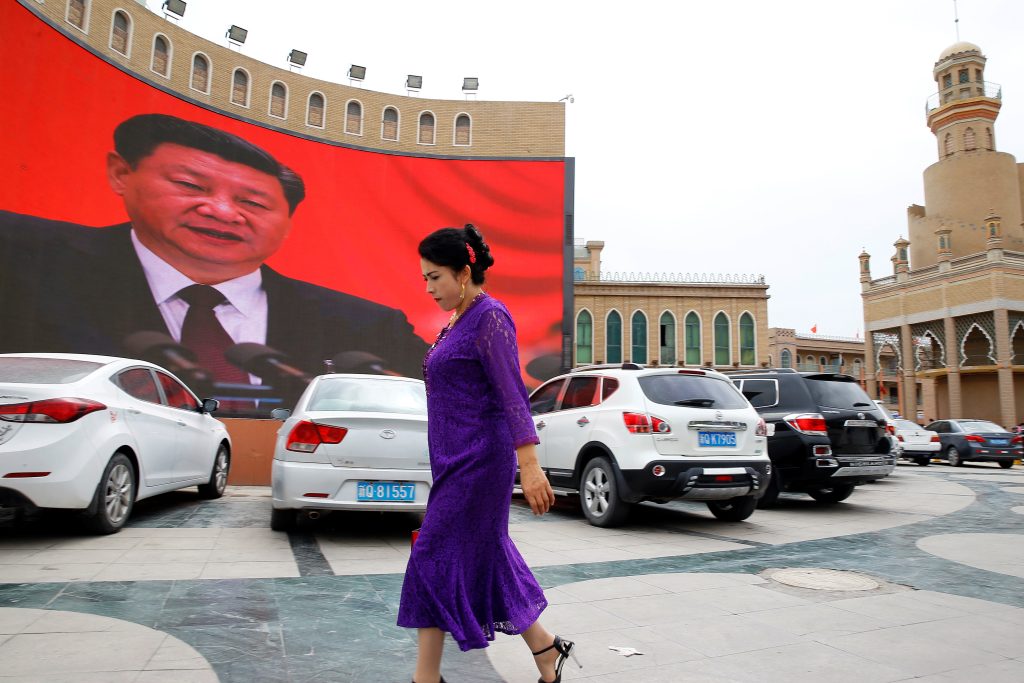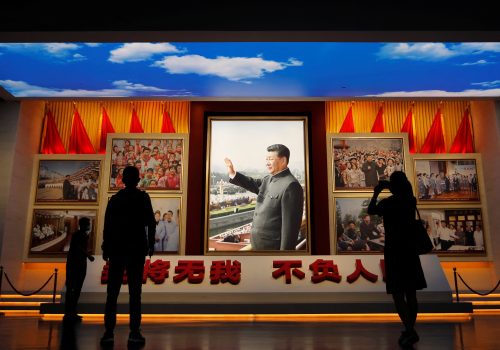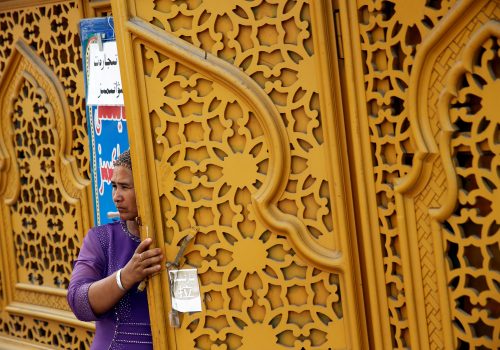“We believe that the world is big enough for both of our countries to thrive,” said US Treasury Secretary Janet Yellen following a short trip to Beijing earlier this month. Her visit came just a few weeks after that of US Secretary of State Antony Blinken, who spoke of fruitful discussions regarding key priorities in the US-China relationship. US Climate Envoy John Kerry was also recently in Beijing and raised the possibility of Chinese leader Xi Jinping and US President Joe Biden meeting in San Francisco later this year. In May, Biden spoke of a coming diplomatic “thaw” with Beijing, and all signs now seem to indicate that the US-China relationship is stabilizing—perhaps even improving.
Such progress is welcomed by some China watchers, given the undeniable need for cooperation between the two nations to address global challenges such as climate change, drug trafficking, post-pandemic recovery, arms control, food security, and economic growth, even as some are wary of whether Beijing’s efforts on these issues are in good faith.
Amid this focus on cooperation, however, critical human rights issues, such as those concerning the Uyghurs, might be overlooked by the global community. Could a renewed emphasis on collaboration inadvertently send a message to China that Uyghur lives can be disregarded for the sake of mutual interests?
As a human rights lawyer and a member of the Uyghur community, I grapple with the horrifying reality that my people are enduring genocide at the hands of a brutal regime.
Xi’s China is vastly different from that of his predecessors. Under its current leadership, the country has built concentration camps on an unprecedented scale, evoking grim memories of World War II. Hong Kong, once a shining beacon of democracy, has lost much of its autonomy and is now more closely aligned with mainland China. Earlier this month, the Hong Kong police placed bounties on exiled pro-democracy activists, leaving them vulnerable no matter how far away they seek refuge. China’s unyielding grasp appears to extend relentlessly, dimming hopes for freedom and escape.
While the restoration of top-level diplomacy between the United States and China holds the promise of de-escalating hostilities and fostering cooperation, it is imperative for the United States to use this opening to demonstrate its unwavering support for the Uyghur community and a staunch commitment to safeguarding global human rights standards.
Where do I stand as a human rights lawyer of Uyghur heritage?
As a human rights lawyer and a member of the Uyghur community, I grapple with the horrifying reality that my people are enduring genocide at the hands of a brutal regime. It is deeply unsettling to see any attempt to normalize such unspeakable atrocities or to treat Uyghur lives as a bargaining chip in pursuit of a stronger bilateral relationship. Genocide should never be regarded as anything remotely ordinary, and its prevention must be a non-negotiable priority. The United States not only bears a moral imperative but a legal obligation under US federal law to prevent genocide. The pain I carry for my community serves as a constant reminder of the urgent necessity for justice and relief from suffering.
Yet, as a policy expert, I also cautiously recognize the crucial importance of fostering stronger US-China ties to tackle shared global issues, as well as the possibility that engagement might bring solutions to China’s ongoing crimes against humanity. And demanding that the United States forgo potential routes for cooperation with China may not be pragmatic or productive. Amid the complexities of confronting genocidal regimes, there lies an undeniable truth: a resolute and united global boycott can wield immense influence in putting an end to the heinous atrocities of genocide. Post-apartheid South Africa stands as a compelling example of such positive transformation. However, the current reality reveals a challenging aspect: Much of the world’s economy is deeply integrated with the Chinese economy, leaving little room for cohesive and united action.
Regarding cooperation as a solution, I am particularly concerned with the possibility that the United States adopts a “forgive and forget” mentality to reconcile on points of bilateral tension. For instance, the United States is reportedly considering lifting sanctions on a Chinese police institute that helped with the mass surveillance of Uyghurs in order to secure Beijing’s assistance on a separate policy issue.
During his visit to China, Blinken met with participants of US-China cultural exchange programs to celebrate their importance to improving cultural understanding and easing tensions between the two superpowers. Devastatingly, absent from these meetings was Ekpar Asat, my brother and an alumnus of one such program organized by the US Department of State. He is currently languishing in China’s prison camps. I must remind the Biden administration that the suffering of Ekpar and other Uyghurs cannot be swept under the rug to emphasize the promise and mutual benefits of these people-to-people exchange programs. Any renewed dialogue must not come at the cost of overlooking China’s egregious human rights abuses.
Holding China accountable
Earlier this month, on behalf of the Atlantic Council’s Strategic Litigation Project (SLP), I submitted a comprehensive report on the human rights situation in Xinjiang for the fourth cycle of the United Nations (UN) Universal Periodic Review (UPR) of China. A four-and-a-half-year process conducted by the forty-seven members of the UN Human Rights Council (HRC), the UPR scrutinizes the human rights records of all UN member states. It draws on information provided by the state under review, UN experts and entities, and other stakeholders, including nongovernmental organizations.
As one such stakeholder submission, the SLP’s report highlights the appalling abuses suffered by Uyghurs and other Turkic minorities. Our findings indicate that the Chinese government has failed to comply with the recommendations from the previous UPR cycle in 2018, as well as those presented in the Office of the UN High Commissioner for Human Rights assessment in August 2022. Instead, China persists in committing widespread human rights violations, including mass arbitrary detention, forced labor, and transnational repression. Given the constraints of word limits, the SLP regrettably did not have the opportunity in its report to properly shed light on other disturbing abuses, including the forced sterilization and sexual violence inflicted upon Uyghur women. These additional horrors further emphasize the gravity of China’s atrocities against Uyghurs.
As China’s review before the HRC coincides with the anticipated warming of US-China relations, US officials face a critical opportunity to reassert their dedication to human rights. The United States must effectively convey to China that implementing the UN’s recommendations is a necessary step toward mitigating tensions and fostering meaningful collaboration. This means that the United States and its allies should present a resolution during the upcoming HRC session to establish an official commission of inquiry into the ongoing human rights violations in Xinjiang.
Ignoring human rights violations means more violations
As his administration pursues better relations with China, Biden should seek to visit individuals such as Ekpar and others who remain incarcerated in prison camps and forced labor factories. Additionally, the United States should push China to showcase its goodwill by freeing my brother and all the other unjustly imprisoned Uyghurs. Enhanced relations between the two nations should be conditioned on China’s willingness to confront its ongoing genocide, embrace a transitional justice system, offer reparations to victims, and uphold human rights principles within the framework of an international rules-based order.
By centering these foreign policy discussions around human rights, the United States would ensure that the Uyghurs’ plight takes precedence, rather than being pushed to the backseat, in any reconciliation efforts with China. Ignoring human rights concerns would only mean more human rights violations on the horizon, an outcome that must be avoided at all costs.
Rayhan Asat is a nonresident senior fellow with the Strategic Litigation Project at the Atlantic Council. As an international human rights lawyer, she focuses on international human rights, atrocity prevention, the rule of law, civil liberties, corporate accountability, and international law.
Further reading
Fri, Oct 7, 2022
What Xi Jinping’s third term means for the world
Issue Brief By Michael Schuman
It has been widely believed for some time, both inside and outside of China, that current Communist Party General Secretary Xi Jinping will break with modern precedent and extend his reign into a third, five-year term. Xi, who also serves as the country’s president, has been working toward this outcome for years.
Fri, Jul 7, 2023
Does Taiwan’s massive reliance on energy imports put its security at risk?
New Atlanticist By Joseph Webster
Taipei relies on maritime imports for around 97 percent of its energy, even as Beijing appears increasingly capable of launching a quarantine, blockade, siege, or even invasion of the island.
Tue, Dec 21, 2021
The US can lead the way to ending China’s modern slavery. My brother is counting on it.
New Atlanticist By Rayhan Asat
Moral arguments have been unable to sway global firms—so it’s time for the full force of the US government to step in.
Image: An ethnic Uighur woman walks in front of a giant screen with a picture of Chinese President Xi Jinping in the main city square in Kashgar in Xinjiang Uighur Autonomous Region, China September 6, 2018. The screen broadcasts a slideshow of images of Xi on loop, including propaganda images of his previous visit to Xinjiang.



